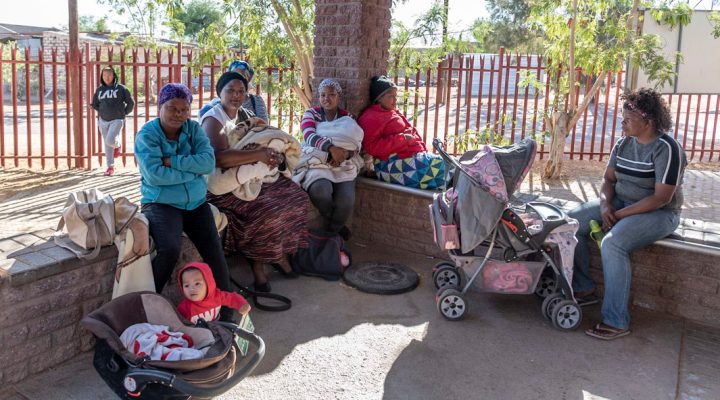Maverick Citizen Op-Ed
‘If we fail to act, Covid-19 will undermine the health of women and children around the world’

Thirty years ago, children were not considered a priority in the AIDS crisis, despite the fact that children were contracting HIV and dying from AIDS. Children were excluded from key research and clinical trials and were seen as an afterthought. It is imperative that we learn from these mistakes as we deal with the impact of Covid-19 on children right now.
In the past decade, we’ve made great progress in the HIV response – both across the globe as well as across the East and Southern Africa region, with fewer deaths and fewer new infections. Globally, new HIV infections in children have been cut by half and since 2000, Malawi, Mozambique, Uganda and Zimbabwe have collectively reduced new paediatric HIV infections by 70%.
Yet progress has stalled, with the global community falling far short of the ambitious United Nations targets to dramatically reduce new HIV infection in children and to keep young women HIV-free. The sudden arrival of Covid-19 has compounded these setbacks and could dramatically reverse all of our gains to date.
Currently, approximately 3.7 million pregnant women, children and adolescents living with HIV in sub-Saharan Africa require uninterrupted access to life-saving antiretroviral treatment (ART). If women and children are unable to access essential HIV services due to disruptions caused by Covid-19, their health will be in jeopardy.
Even before Covid-19, children lagged behind in the global AIDS response. Today, only half of children with HIV have access to the treatment they need to survive and thrive. Without treatment, half of them will die before their second birthdays. Children consistently suffer lower viral load suppression compared to adults, making them vulnerable to severe illnesses. As we tackle Covid-19, there are clear lessons to be gleaned from the HIV response.
Thirty years ago, children were not considered a priority in the AIDS crisis, despite the fact that children were contracting HIV and dying from AIDS. Children were excluded from key research, and clinical trials and were seen as an afterthought. Advocates such as Elizabeth Glaser stood up, not just for her own children, but all children infected with and affected by HIV globally, helping to drive understanding that diseases and drugs affected children uniquely, and advocating for new medications and legislation to address their needs. It is imperative that we learn from these mistakes as we deal with the impact of Covid-19 on children right now.
There is limited evidence that children have been mildly affected by Covid-19. However, the emergence of the severe Paediatric Multisystem Inflammatory Syndrome (PMIS) across Europe and the US demonstrates the need for ongoing vigilance across all age groups. With so much at stake, we cannot afford to repeat the early history of paediatric HIV and AIDS with Covid-19 — or children will be left behind yet again.
Simply put, if we fail to act, Covid-19 will undermine the health of women and children around the world.
In addition, some Covid-19 control measures – including lockdowns and travel restrictions – coupled with fear, could result in reductions in access to health services, particularly for mothers and children. This would mean fewer pregnant women receiving HIV services necessary to keep them healthy and further limiting access to timely early infant HIV diagnosis and treatment.
While millions of lives have been saved in the last two decades through prevention of mother to child transmission of HIV, we could soon see unacceptable increases in new pediatric HIV infections if mothers experience Covid-19 as a barrier to accessing necessary health services.
A modelling study released in May 2020 showed that Covid-19-related disruptions in ART services could have severe impacts on mortality, resulting in doubling or tripling the estimated number of HIV deaths in 2020.
UNAIDS estimates that service interruptions in Malawi, Mozambique, Uganda and Zimbabwe could erase two decades of critical gains in HIV prevention and treatment – a staggering reality to consider.
Governments must prioritise women and children in both the HIV and Covid-19 strategies and ensure HIV commodities and services for pregnant women and families continue to be available, accessible, and of high quality. As we navigate through Covid-19, creative approaches such as multi-month and community drug dispensing must be adopted to reduce potential client exposure to Covid-19 at health facilities, and ensure continuity of care.
Even when it may not be obvious how mothers and children are impacted by the Covid-19 pandemic, we must strive to understand the nuanced needs of these vulnerable populations and respond accordingly. To do anything less is to repeat the mistakes of the past – and that is a risk we cannot afford to take.
An AIDS-free generation can still be achieved, but only if we take urgent, and specific steps to protect mothers and children through timely diagnosis and sustained access to high-quality life-saving ART. Leaders must act swiftly, and with purpose to fight HIV and AIDS alongside Covid-19 in order to protect these most vulnerable communities. DM/MC
Chip Lyons is the CEO and President of the Elizabeth Glaser Pediatric AIDS Foundation. Maurine Murenga is the Founder and Executive Director for Lean on Me Foundation and an advocate for children’s rights.
"Information pertaining to Covid-19, vaccines, how to control the spread of the virus and potential treatments is ever-changing. Under the South African Disaster Management Act Regulation 11(5)(c) it is prohibited to publish information through any medium with the intention to deceive people on government measures to address COVID-19. We are therefore disabling the comment section on this article in order to protect both the commenting member and ourselves from potential liability. Should you have additional information that you think we should know, please email [email protected]"



 Become an Insider
Become an Insider